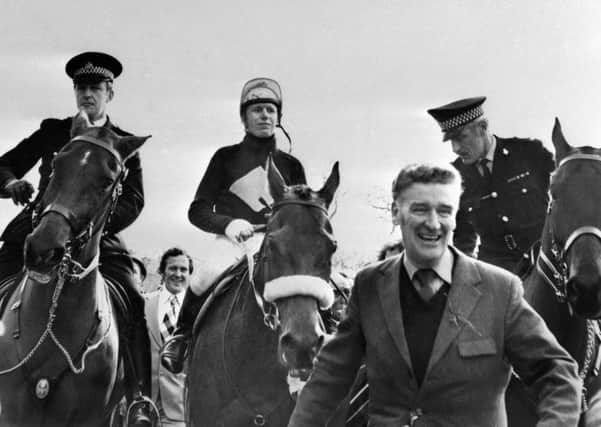Salute to quiet hero who captured Grand National three times


A victim of the infamous melee in the 1967 renewal won by Foinavon, Fletcher won the following years’ race on Red Alligator before recording back-to-back wins in 1973 and 1974 on Ginger McCain’s ‘miracle horse’ Red Rum.
Second in 1975 on the hat-trick seeking Red Rum, Fletcher had been replaced by Tommy Stack when the legendary horse recorded his third National victory in 1977.
Advertisement
Hide AdAdvertisement
Hide AdTo put the County Durham jockey’s record in perspective, just two other riders – Lester Piggott’s grandfather Ernie and the 19th century riding star George Stevens – have won three or more Nationals.
“He was a fantastic horseman and his record around Liverpool proves that,” says Scott, who rode Merryman II to glory in 1960 for Middleham trainer Neville Crump.
“I couldn’t tell you another rider with a better record round there. He was such a quiet, reserved man. When I was going to school in Barnard Castle, I used to leave my bike at his father Eddie’s house in Cockfield. That’s how far we went back.
“He was a quiet man. He would go in, do a job and walk away quietly without saying a dickie bird. Three Grand Nationals, he didn’t get the accolades that a lot of other people would have got. Most jockeys would settle for one National. He won three.”
Advertisement
Hide AdAdvertisement
Hide AdScott, who lives near Middleham, also praised the courage of Fletcher, who suffered multiple injuries in a fall at the now defunct Teesside Park racecourse in the early 1970s and was told by the medical authorities to hang up his saddle.
Fletcher told the specialist: “I’m sorry, sir, I wouldn’t know what to do with myself and I would prefer to give it a bit more time and come back to see you in a couple of months.”
Eight months later, he rode Red Rum to victory at Ayr – the aforementioned Stack was unavailable – and National immortality beckoned, the partnership only coming to end after the horse was second to L’Escargot at Aintree in 1975.
Scott’s sentiments were shared by Pat Buckley, who rode Ayala to victory in 1963.
Advertisement
Hide AdAdvertisement
Hide Ad“We travelled around together,” said Buckley. “He didn’t say that much, but what he said made sense. Brian was an excellent horseman. I wouldn’t say he was all that stylish, but to sit and watch him was an education.
“He always knew where to be, particularly at Liverpool, it was instinctive. He was never very exuberant after a winner, he always had a funny smile on his face as if he was saying: ‘I whipped you lads again’.”
Buckley, who rode in the famous 1973 race, added: “I fell early, at the first ditch I think. Crisp and Richard Pitman made it a furious pace. I was standing at the last fence and by then you could see that Crisp had had enough. Brian, on the other hand, wasn’t catching pigeons either, but he wouldn’t give in and that was one of his great attributes.
“I think that was one of the most brilliant exhibitions around Liverpool I’ve ever seen. He could have thrown the towel in at Becher’s the second time, but he kept at him. Winning the National three times never changed him. We had a function at Aintree for Bob Champion’s Cancer Trust and Brian wasn’t at it. When we came out of the marquee, poor Brian was stood there and he said: ‘nobody asked me to come in’. Most of us guys have kept in touch, it’s easier now with Facebook and what have you, but Brian sort of faded into obscurity.”